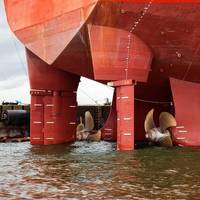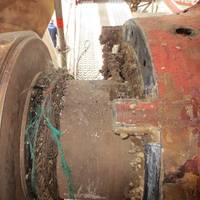Gard: Increase in Stern Tube Damage Concerning

The number of stern tube-related damage claims has increased considerably over the last few years, and this is causing marine insurer Gard some concern.In the past, damage to a stern tube was often considered a relatively straightforward casualty by surveyors. The cause was often obvious – contact with a floating object such as ice, fishing nets or ropes, for example.These causes still exist, but the significant increase in frequency over the past years, without any apparent explanation…
Australia Hosts GloFouling Event
The GEF-UNDP-IMO GloFouling Partnerships project has concluded its inaugural Research and Development Forum and Exhibition on Biofouling Management, in Melbourne, Australia (1 to 4 October).Bringing together experts, regulators and industry representatives to discuss the latest advances in research, regulations and technologies related to marine biofouling across all maritime sectors, this is set to become the project’s biennial “signature event”.Over 170 participants and 40 speakers took part in a program that focused on how biofouling affects different maritime industries, including shipping, aquaculture and ocean renewable energies…
Don’t Forget: Seawater is a Free EAL

If your vessel is trading in U.S. waters, you need to be aware of the new oil to sea interface law that comes into effect on Dec. 19, 2013. According to the new U.S. Environment Protection Agency Vessel General Permit (VGP), all vessels built on or after Dec. 19, 2013, must use an environmentally acceptable lubricant (EAL) in all oil to sea interfaces. For all vessels built before this date, unless technically not feasible, ship owners must use an EAL in all oil to sea interfaces. Additional information on the EPA’s VGP can be found at http://cfpub.epa.gov/npdes/vessels/vgpermit.cfm#final.
U.K. EA Authorizes Dismantling of U.S. Ships
The UK Environment Agency (EA) has issued a modification to the waste management license of Able UK such that the company may engage in the dismantling of U.S. ships at its Teesside Reclamation and Recycling Centre. Able UK submitted an application to the Agency on July 31, 2003 to modify the existing licence for its Teesside Reclamation and Recycling Centre (TERRC) site, to permit an increase in its handling capacity from 24,500 to more than 75,000 tonnes per year. In issuing the licence the Agency has restricted the annual amount handled to 200,000 tonnes. The Agency granted the modification after it had undertaken a thorough assessment reviewing all the potential environmental risks to the Tees Estuary and the surrounding sensitive habitat sites.
The New IMO Treaty to Ban TBT
The Diplomatic Conference held (October 1-5, 2001) by the International Maritime Organization (IMO) in London adopted the Draft Convention prepared by The Marine Environmental Protection Committee (MEPC) of IMO for the "Control of Harmful Anti-fouling Systems for Ships." The Convention has been developed to immediately ban the use of Tributyltin (TBT) globally in antifouling paints to "protect the marine environment". The ban on TBT has come about because TBT has detrimental effects on non-target marine organisms. In November 1999, IMO agreed that a Treaty be developed by the MEPC to ensure a ban on the application of TBT based antifouling paints by January 1, 2003, and a total ban on the use of TBT by January 1, 2008.





